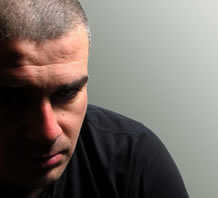*****WE ARE OPEN FOR APPOINTMENTS*****
Face to Face and Webcam Consultations available.
Agoraphobia - Stoke on Trent & Newcastle under Lyme
Agoraphobia is an anxiety driven condition. Often misunderstood by the lay man, Agoraphobia is not necessarily a fear of going outside or wide open spaces. Agoraphobia could perhaps be better summed up as the fear of being away from a safe place.
Finding effective treatment for agoraphobia can be difficult. Many sufferers cannot physically make it to appointments with their GP or mental health specialist. Feedback from our own clients also suggests that 'telephone support' from the NHS and their providers produce little in terms of results or recovery. If you find yourself (or a loved one) in this position, it is understandable that you may be feeling distraught that there seems to be no help out there. However, there is effective agoraphobia help available and you are going to learn all about it right here!
We're going to explain step by step how your agoraphobia works, maintains itself and how with our help you can recover and have your life back. Just a quick note here: If you can't be bothered to invest ten minutes of your life reading this information - then you're not ready to recover.
What Are The Symptoms Of Agoraphobia?

Agoraphobia is driven by the emotional state of anxiety. Generally speaking, in agoraphobics the fear of 'what may happen' over-rides the normal decision making processes enjoyed by people without the condition. So for example, when a non-sufferer needs some bread - they simply go to the shops and buy a loaf. However, when an agoraphobic needs some bread the mere thought of going to the shop can create crushing levels of anxiety.
In life, our decisions are based upon how we feel. Thus when an agoraphobic feels crushing levels of anxiety when thinking about leaving their safe place - it's hardly surprising that they'll only go under intense duress or not at all.
When we read deeply between the lines, agoraphobia isn't actually about going to certain places or leaving a safe place - it's more to do with the emotional responses performing such actions (or even thinking about it) creates. What we mean by this is that an agoraphobic may feel intensely anxious about visiting their local supermarket, yet their neighbour (a non-sufferer) doesn't give it a second thought. You see the supermarket isn't actually an 'unsafe place'. If it were unsafe then everyone would feel anxious about going there.
The real problem the agoraphobic faces is that their mind dwells and ruminates on the supermarket visit. This ramps up the anxiety levels to a near panic state. Once in this state it becomes increasingly difficult to make 'rational decisions' and the likelihood of experiencing a panic attack becomes significantly increased.
It would follow that 'heightened levels of anxiety', 'panic attacks' and 'ruminating on thoughts' are all symptoms that can be added to the underlying fear of being away from a place of safety. Is this what happens to you or your loved one?
The Truth About How Agoraphobia Works...

Agoraphobia is NOT about safety. Agoraphobia is about the 'perception of safety' and all perception is derived from thoughts. We appreciate it is easy to assume that if you contemplate going to a certain place and feel bad, then it must be the place that you have a problem with.
However, if this is your perspective then you are indeed doomed to suffer for the rest of your life. The reason is simple - you can't CHANGE all the places you feel bad about. They are physically there in reality and no amount of you feeling bad about it will change anything. Thus if you are in a cycle where you 'blame' various places for making you feel bad and those places continue to exist - you will continue to feel bad!
In truth your problem isn't with the actual places... nor is it the places that make you feel bad. In reality what makes you feel bad are your THOUGHT PROCESSES. If you think about a given place and feel bad, it's the THINKING that makes you FEEL BAD - not the place.
Let's imagine you're at home in your safest of safe places and you have an upcoming appointment at your GP's surgery. You don't like the surgery because it's always busy with lots of people and noise, plus you have to wait there for ages and can't leave until you've seen your GP. When you sit at home (in your safe place) and 'think' about attending the surgery - do you feel anxious? Does the thought of the waiting, the people, the noise and the idea of being trapped there make you feel anxious?
Interestingly most of an agoraphobics anxiety is suffered in their safe place... as they 'think' about being unsafe elsewhere. In the above example the agoraphobic wasn't at the GP's surgery, they were safe at home worrying and feeling anxious about what may happen during the appointment. Thus it is the THOUGHT that creates the anxiety - not the place.
Let's consider another angle within the agoraphobia spectrum. As an agoraphobic, would you say you spend an above average amount of time feeling anxious? Also as an agoraphobic would you say that you feel anxiety more intensely than a non-sufferer would? It's quite probable that you've answered yes to these questions. Now think of a time when you were feeling either intensely angry or intensely jealous. Looking back with the benefit of hindsight, how rational were the decisions you made when you were feeling those intense emotions? Pretty lousy on the decision making front - right?
The reason for this is that when we are caught up in intense emotional states, the rational part of our brain becomes compromised. The more intense the emotional state - the more compromised our rational decision making processes become. So, would you agree that although when calm and composed you can rationalise that agoraphobia doesn't serve you - yet when in the clutches of intense anxiety you can't seem to make rational decisions?
In this section we've established that the majority of anxiety suffered by an agoraphobic is due to their thought processes (rather than safety or places) and that when suffering with intense anxiety an agoraphobic will struggle to make good decisions.
The Mechanics And Cycle Of Agoraphobia...

You weren't born with agoraphobia - so this means you must have learned to do it somewhere along the way. This is good news as we can capitalise on the way the mind works. You see, the mind will always use the best way it understands to perform any given task. Although at the moment your mind is prioritising your 'perceived safety' over having a life, it's only working this way because it lacks a method of perceiving your safety AND letting you have a life at the same time. Your mind (at the moment) only has the choice to do one or the other... and it's gone overboard with perceived safety.
You've no doubt tried to rationalise your problem over and over, yet even though you realise that on a logical level it makes little sense - it doesn't stop you doing it. The reason for this is very simple - agoraphobia is an emotionally driven disorder, not a rationally driven disorder. You can throw logic and reason at agoraphobia until you're blue in the face but it wont make a scrap of difference in terms of making it go away.
Why Rationalisation And Logic Wont Fix Agoraphobia...

Here's an analogy we commonly use to explain to our clients why rationalisation and logic wont fix an emotional problem:
Let's say you have a sixteen year old daughter that's just started dating a 25 year old loser. He's always drunk or on drugs, has no qualifications or job, has a history of petty theft and violence and perhaps most disturbingly of all he has numerous offspring spread around the city, all by different women, none of which he takes care of. Now, fearing the inevitable you take your precious daughter to one side for a chat about her future. You lay out one fact after another with respect to her new boyfriend. You talk about the drink, the drugs, the lack of qualifications, no job, his criminal history and also the fact that when one of his girlfriends falls pregnant he abandons them. You are satisfied there's no arguing with your logic and that you've covered every angle... then your daughter turns to you and says "but I love him".
Is the young girl going to listen to reams of facts, logic, reason and rationalisation? Of course not - she's going to listen to her emotions! The same is true of the agoraphobic. Emotions (fear and anxiety) will out weigh any amount of logic or reason. The truth is that emotions and logic simply don't mix, so you simply can't use logic to somehow make emotions go away.
Not only is agoraphobia driven by emotions - it also runs in cycles. If it didn't cycle you'd only have experienced it once and it would have gone away after that. However, as agoraphobia is an ongoing problem, it stands to reason that a self perpetuating cycle is running.
As with any self perpetuating cycle, it needs a start point. So, let's start with when you wake up in the morning. What runs through your mind? Do you dwell on the day (or days) ahead, speculating and worrying about what may happen?
When you speculate about what may happen do you feel bad as though IT IS going to happen? Funnily enough I was speaking to an agoraphobic recently and I asked her how much of her day she spent dwelling on things that she didn't want to happen. She thought about it for a while and implied that in the absence of her distracting herself with housework she dwelled and speculated with unpleasant thoughts for most of the day. Next I asked her as a percentage (so out of 100 things she dwelled upon) how many of those things actually came true in reality. She sat back and thought for maybe seven or eight minutes without saying a word. Then she leaned forward, smiled and said that although she couldn't remember a hundred instances, she was confident that only about 2% (two out of every hundred) actually happened in reality. She then laughed and said that out of those two, neither of them turned out anywhere near as badly as she'd anticipated in her head. Isn't it interesting how radically different dwelling and speculation are compared to real life. Once more this is proof that agoraphobia is driven by your thought processes and not by reality or anything on the outside.
Why Do You Keep Dwelling On Your Fear Of Being Away From Safety?

Would you agree that you are bombarded with thoughts which scare you and make you feel anxious? The more anxious you feel, the more you try to take control of what you can and avoid the rest?
So why do you suppose that your mind keeps popping these anxious thoughts into your head? Are you crazy or insane? The truth is that you're neither. Your brain is functioning perfectly and as it is meant to. However, it is running thought processes (over and over) which are making you feel bad. In this section you're going to learn why the thoughts keep on cycling and how (with our help) you can make them stop - yes seriously!
The first question you need to ask yourself is - 'how does my brain know what is important and what is not?' We actually get lots of varied answers to this question, but the bottom line is that if you get a strong feeling (emotional response) to a thought or situation - your brain classes it as important. If you have a thought or experience that stimulates no feelings or emotional response, your brain considers it to be unimportant.
The easy way to justify this is true is to try and remember something dull or uneventful. The reason this is tough to do is because the brain has discarded the information as it considered it to be unimportant. Now, how easy is it to remember the highly charged anxiety laden thoughts you're used to having? It's easy because your brain has classed those thoughts as important (because of the associated emotional response) and stored them somewhere very safe.
How To Stop Compulsive Anxious Thoughts...

However, it goes even deeper than that. You know how sometimes you're not really paying attention to anything in particular and 'bam' - an anxious thought just appears seemingly from nowhere? Well that thought hasn't actually come from nowhere. That thought has been in storage for two reasons. The first reason is that it carried strong emotional charge from a previous dwelling session (hence according to the brain it's important), and the second reason is that the brain considers it to be unresolved and requires your attention.
The reason these thoughts keep bombarding you is that each time one pops into your head, you dwell on it, speculate about what may happen and this in turn generates the feelings of anxiety. The brain then associates the anxiety with the thought and classes the thought as important. The thought is put into temporary storage as important and unresolved. An hour later (or whatever) you're not really focusing on anything and the brain pops the thought back into your awareness... and the cycle runs yet again.
The ONLY way to fix this problem is by separating the emotional state from the thought. This causes the cycle to break down and stop running. When the cycle stops running - the thoughts stop plaguing you. It's a relatively simple process which requires a reasonable level of persistence, but it works. We've pioneered our own system for doing this and we'll show you how to do it for yourself if you decide to work with us.
If you're happy to sit back and feel sorry for yourself, moan and groan about how there's no help on the agoraphobia forums and endlessly search for a magic drug to make things right - we can't help you. We only work with people who have had enough of agoraphobia and can put their hand on their heart and say "I'll do whatever it takes to beat this thing!". If this is you, read the next section.
How To Successfully Recover From Agoraphobia And Get Your Life Back

First of all we appreciate it comes with the agoraphobia territory that getting out to appointments can be tough for many sufferers. If you genuinely can't make it to our Clinic we do reserve a few appointment slots each week for visiting clients at home. Obviously this is restricted to the local Stoke on Trent and Newcastle under Lyme areas and will incur an additional fee for travel time. Our fees can be found by clicking the link below:
Here's a link for further information on Face to Face Consultations at our Clinic in Staffordshire and for Home Visits.
If you don't live in Stoke on Trent or Newcastle under Lyme but like what we have to say, you have the option of working with us online via Skype. In fairness, working online isn't as effective as working face to face - however, when we hear from our clients about the alternatives available from GP's and the NHS, it puts the quality of our service in perspective.
Here's a link for further information on Telephone/Online Consultations if you live outside of Stoke on Trent and Newcastle..
If you'd like to discuss your case with a Consultant, we'd be pleased to answer any questions you may have over the phone. There is no charge or obligation and we simply don't do sales pitches. If you decide you'd like us to work with you then we'll make the necessary arrangements. If having spoken to us you decide not to proceed or if having discussed your case we feel we are unable to help you - then we'll part ways on good terms and nothing will be owed.
In reality the only thing you stand to lose is the misery agoraphobia brings you. You can sit and dwell (and make yourself feel worse) or you can pick up the phone and do something about it. The choice is yours. Our phone number is 01782 855585.







